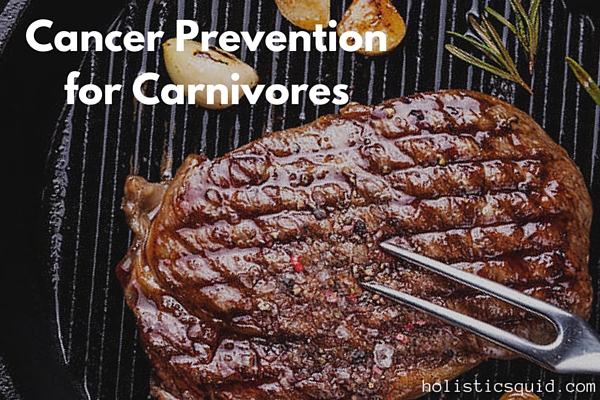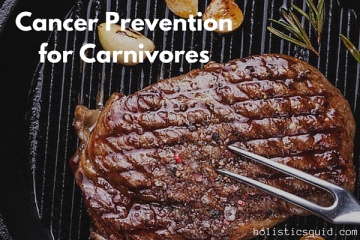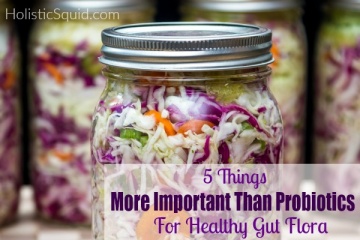
In our previous article about the the red meat cancer scare, Natcha Maithai, nutritionist and cancer researcher, discussed the recent World Health Organization report – The Carcinogenicity of Red and Processed Meats – which took the internet by storm as it was misinterpreted as claiming that red meat causes cancer.
Actually, there is more to the story, because the carcinogenicity of red meat depends on what other foods you eat and the way you live your life. Let's take a look at the diets and lifestyle factors for cancer prevention for red meat eaters. ~Emily
Why scientists think red meat may cause cancer
Red meat may contain several substances that cause DNA damage and increase oxidative stress, which may lead to cancer. These include heme iron, polycyclic aromatic hydrocarbons (PAH), N-nitroso compounds, and heterocyclic amines (source).
In addition, our gut bacteria can ferment some of these compounds from red meats into chemicals that can cause cancer, like hydrogen sulfide, indoles, and ammonia. Lastly, the elimination of these compounds involve the detoxification pathway in the liver that also detoxifies excess estrogens. Therefore, eating red meats may worsen estrogen dominance, which can increase risks for hormone-driven cancers like breast, ovarian, endometrial and even prostate cancers.
However, it is not as simple as eating red meat directly causes cancer, because we also eat foods other than just red meats. Therefore, it is not the same as directly ingesting these chemicals.
What does cancer prevention entail?
Cancer is a multifactorial disease, which means that many things have to be sufficiently messed up before mutant (transformed) cells can develop into full-on cancer. Your body has numerous checks and balances to prevent cancer.
By the time these cells become cancer, they have accumulated numerous mutations and learned to evade every check and balance that the human body has to stop cancer. Then, they have to figure out how to make their own blood vessels (angiogenesis) to feed on and grow.
What causes cancer really isn’t as simple as a cold virus causes a cold. Everything we eat, do, think, and live can either increase or decrease the risk of cancer. The most effective cancer prevention strategy is therefore to tip the scale against cancer and to support your body’s own cancer prevention systems. Here's how:
Cancer prevention tips for carnivores
#1 – Cook your meat gently and avoid open flame cooking.
While red meats do contain some cancer-causing substance like PAH, it is a significant source only when charred meats are consumed consistently (source). Meat drippings that contain fat will burn and become carcinogenic when they hit a heat source like a burning charcoal. Therefore, it is better to cook your meats gently, the lowest heat possible to generate the desired outcome. Choose boiling, braising, and steaming over frying, broiling, or grilling.
If you prefer broiling, they found that using a method where the heat source is above the meat is preferable as this reduces the incidence of carcinogenic smoke hitting the meat.
#2 – Eat colorful fruits and vegetables, especially cruciferous vegetables
Vegetable intakes are generally associated with lower risks of cancer (source). In addition, a study in rats found that chlorophyll, a substance that makes green vegetables green, can mitigate the potential cancer-causing properties of heme iron in the colon.
Cruciferous vegetables like broccoli, Brussels sprouts, cabbage and cauliflower contain substances that can aid in detoxification of PAH (source).
Numerous plant-based substances from colorful fruits, vegetables and nuts have been shown to stop angiogenesis, a process that allows solid tumors to make their own blood vessels in order to grow and spread (source).
If you eat a lot of red meat like I do, it is a good idea to eat a diverse array of cancer-preventing plant-based foods, including at least five servings a day of greens to get this health benefit.
#3 – Don’t skimp on your antioxidant-rich seasonings
Studies show that many plant chemicals found in rosemary, basil, and mint have been shown to have antioxidant properties that also kill cancer cells. In addition, foods that are high in sulfur like garlic and onions contain chemicals that can help reduce the risks of cancer, as well as with detoxification (source).
Therefore, you want to generously season your meats and side dishes with generous amounts of good quality and fresh seasonings. For our recommendation, check out Primal Palate organic spices.
#4 – Live a cancer prevention lifestyle
Cancer is often initiated by things that can mutate DNA, e.g. radiation, mutagenic chemicals and oxidative damages. What allows these mutated cells to become cancer are inflammation and a weak immune system that fails to get rid of the mutated cells.
To prevent cancer, you want to make sure you live a low toxin lifestyle, so minimize your exposure to harmful chemicals and radiation as much as possible. Eat organic foods and use toxin-free cosmetics, home care, and body care products.
Avoid vegetable seed oils such as canola, soybean, corn and peanut oils because they are easily oxidized and their high omega-6 content can be pro-inflammatory. Cook with more stable fats that contain natural saturated and monounsaturated fats, like ghee, lard, olive oil and avocado oil.
You want to manage inflammation and address any chronic inflammatory problems with an integrative physician. Also, ensure that your immune system is functioning well with a nutrient-dense diet and a healthy gut flora.
Also, cancer cells are fed on glucose and an amino acid called glutamine. This does not mean that you have to give up carbs to prevent cancer. What it means is that you should maintain a stable, healthy level of blood sugar and insulin sensitivity. In order to maintain insulin sensitivity, you want to manage stress, get quality sleep every night, eat a healthy diet, and exercise.
In short, cancer prevention comes down to living a healthy, non-toxic primal lifestyle. It is not rocket science. This means eating a nutrient-dense, high-antioxidant diet that stabilizes your blood sugar at a healthy level, which also means keeping stress at bay and sleeping well.
Lastly, don’t forget to follow through with regular cancer screening tests or procedures as recommended by your physician. For many types of cancers, this can be life-saving.
What do you do to prevent cancer for you and your family?
Please share in the comments below.
Natcha Maithai is a cancer researcher turned “health detective.” She helps investigate hormonal problems for her clients and demystify relevant biomedical research for the general public. She is passionate about helping women become masters of their bodies through fitness, nutrition, hormone balancing, functional medicine and quantified-self technologies. Find her at natchamaithai.ca.












Leave a Reply